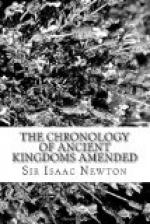sphisin hikanon enoikesasthai heurontes, epei en Aigypto
polyanthropia ek palaiou en; es Libyen mechri stelon
ton Herakleous eschon; entautha te kai es eme tei
Phoinikon phonei chromenoi oikentai]. Quando ad
Mauros nos historia deduxit, congruens nos exponere
unde orta gens in Africa sedes fixerit. Quo tempore
egressi AEgypto Hebraei jam prope Palestinae fines
venerant, mortuus ibi Moses, vir sapiens, dux itineris.
Successor imperii factus Jesus Navae filius intra
Palaestinam duxit popularium agmen; & virtute usus
supra humanum modum, terram occupavit, gentibusque
excisis urbes ditionis suae fecit, & invicti famam
tulit. Maritima ora quae a Sidone ad AEgypti
limitem extenditur, nomen habet Phoenices. Rex
unus [Hebraeis]_ imperabat ut omnes qui res Phoenicias
scripsere consentiunt. In eo tractatu numerosae
gentes erant, Gergesaei, Jebusaei, quosque aliis nominibus
Hebraeorum annales memorant. Hi homines ut impares
se venienti imperatori videre, derelicto patriae solo
ad finitimam primum venere AEgyptum, sed ibi capacem
tantae multitudinis locum non reperientes, erat enim
AEgyptus ab antiquo foecunda populis, in Africam profecti,
multis conditis urbibus, omnem eam Herculis columnas
usque, obtinuerunt: ubi ad meam aetatem sermone
Phoenicio utentes habitant_. By the language
and extreme poverty of the Moors, described
also by Procopius and by their being unacquainted
with merchandise and sea-affairs, you may know that
they were Canaanites originally, and peopled
Afric before the Tyrian merchants came
thither. These Canaanites coming from
the East, pitched their tents in great numbers in
the lower Egypt, in the Reign of Timaus,
as [253] Manetho writes, and easily seized
the country, and fortifying Pelusium, then
called Abaris, they erected a Kingdom there,
and Reigned long under their own Kings, Salatis,
Boeon, Apachnas, Apophis, Janias,
Assis, and others successively: and in
the mean time the upper part of Egypt called
Thebais, and according to [254] Herodotus,
AEgyptus, and in Scripture the land of Pathros,
was under other Kings, Reigning perhaps at Coptos,
and Thebes, and This, and Syene,
and [255] Pathros, and Elephantis, and
Heracleopolis, and Mesir, and other great
cities, ’till they conquered one another, or
were conquered by the Ethiopians: for
cities grew great in those days, by being the seats
of Kingdoms: but at length one of these Kingdoms
conquered the rest, and made a lasting war upon the
Shepherds, and in the Reign of its King Misphragmuthosis,
and his son Amosis, called also Tethmosis,
Tuthmosis, and Thomosis, drove them
out of Egypt, and made them fly into Afric
and Syria, and other places, and united all
Egypt into one Monarchy; and under their next




